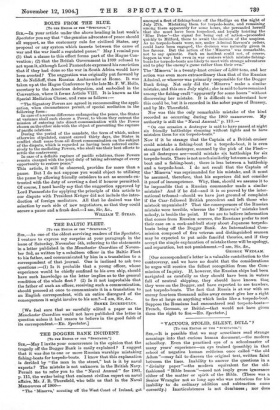SIR, —May I invite your concurrence in the opinion that the
tragedy off the Dogger Bank is easily explained ? I suggest that it was due to one or more Russian warships mistaking fishing-boats for torpedo-boats. I know that this explanation is derided by " the man in the street," but is it by naval experts ? The mistake is not unknown in the British Navy. Permit me to refer you to the " Naval Annual " for 1901, p. 115, the writer being that eminent civilian expert on naval affairs, Mr. J. R. Thursfield, who tells us that in the Naval Mancenvres of 1900—
"The Minerva,' scouting off the West Coast of Ireland, got
Blue Peter'—the signal for being out of action—proceeded quickly to Milford, there to await the decision of the umpires. As no torpedo-boats were, nor, under Admiral Rawson's orders, could have been engaged, the decision was naturally given in her _favour. But the action of the Minerva' was remarkable, not to say quixotic. Such an incident could not, of course, happen in war; but even in war cruisers which mistake fishing- boats for torpedo-boats are likely to meet with strange adventures and to play the enemy's game rather than their own."
The `Minerva' is a twenty-knot cruiser of 5,600 tons, and her
action was even more extraordinary than that of the Russian Admiral, or whoever was primarily responsible for the Dogger Bank firing. Not only did the Minerva' make a similar mistake, and this on a July night ; she is said to have remained among the fishing craft " apparently for some hours " without discovering her mistake. It is difficult to understand how this could be, but it is recorded in the sober pages of Brassey, and by Mr. Thursfield.
Nor was this the only remarkable mistake of the kind recorded as occurring during the 1900 manoeuvres. My authority is still the " Naval Annual," p. 113 :—
" On one occasion a destroyer is said to have passed at night six friendly battleships steaming without lights and to have mistaken them for six torpedo-boats."
Now if it be strange that the Captain of a British cruiser could mistake a fishing-boat for a torpedo-boat, it is even stranger that a destroyer, manned by the pick of the Fleet— as all destroyers are—could mistake six battleships for six torpedo-boats. There is not much similatity between a torpedo- boat and a fishing-boat ; there is less between a battleship and a torpedo-boat. I do not recall that the Captain of the Minerva' was reprimanded for his mistake, and it must be assumed, therefore, that his superiors did not consider it proof of incompetence. Why, then, should we assume A to be impossible that a Russian commander made a similar mistake ? And if he did—and it is so proved by the inter- national tribunal—should we have just ground of complaint if the Czar. followed British precedent and left those who mistook unpunished P That the consequences of the Russian mistake were terrible, whereas the Minerva's ' mistake hurt nobody, is beside the point. If we are to believe information that comes from Russian sources, the Russians prefer to rest their case on a cock-and-bull story about Japanese torpedo- boats being off the Dogger Bank. An International Com- mission composed of five veteran and distinguished seamen may be expected to put aside fanciful theories, and if they accept the simple explanation of mistake there will be apology, and reparation, but not punishment.—I am, Sir, &c.,
GEORGE WEDLAM.
[Our correspondent's letter is a valuable contribution to the controversy, and we have no doubt that the considerations he urges will receive the fullest recognition from the Com- mission of Inquiry. If, however, the Russian ships had been navigated as carefully as they should have been in waters full of neutral shipping, they should have known that they were on the Dogger, and have expected to see trawlers, not torpedo-boats. The fact that Russia is at war with an enemy fourteen thousand miles away cannot give her a right to fire at large on anything which looks like a torpedo-boat. Suppose the Russians had encountered real torpedo-boats- French, German, or British—that would not have given them the right to fire.—ED. Spectator.]
" VACUOUS, STOLID, SILENT, DULL "
[To THE EDITOR OF THE " SPECTATOR." I










































 Previous page
Previous page